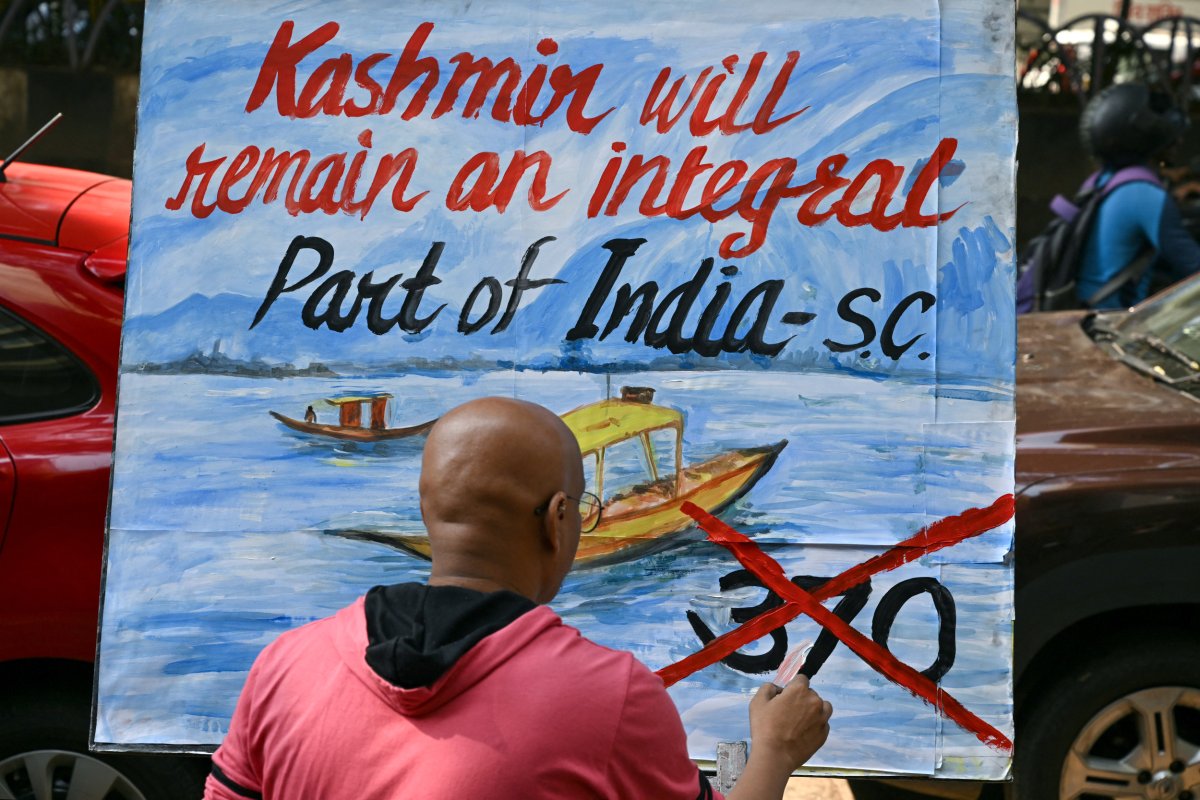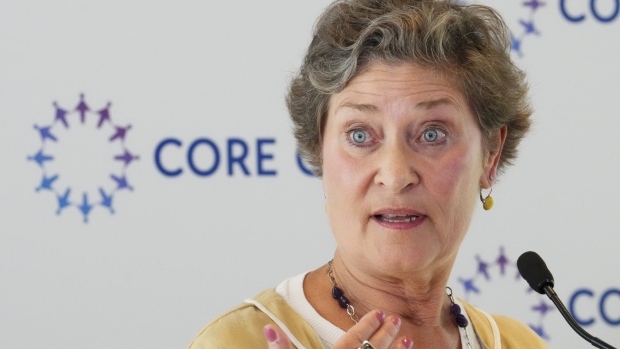Jon Gambrell, Jamey Keaten, Seth Borenstein, Sibi Arasu
Countries moved closer to reaching what critics called a watered-down final deal on how to act on climate change on Monday, avoiding calls from more than 100 nations to phase out planet-warming fossil fuels as the United Nations summit in Dubai neared its culmination.
A new draft released Monday afternoon on what's known as the global stocktake – the part of talks that assesses where the world is at with its climate goals and how it can reach them – called for countries to reduce “consumption and production of fossil fuels, in a just, orderly and equitable manner”.
The release triggered a frenzy of fine-tuning by government envoys and gimlet-eye analysis by advocacy groups, just hours before the planned late morning finish to the talks on Tuesday – even though many observers expect the finale to run over time, as is common at the annual U.N. talks.
Small island nations, some of the most vulnerable places in a world of rising temperatures and seas, blasted the draft and were trying to decide their options. Final decisions by COPs have to be by consensus and objections can still torpedo this. Activists said they feared that potential objections from fossil fuel countries, such as Saudi Arabia, had watered down the text.

PETER DEJONG/AP
Demonstrators hold signs that reads "hold the line" and "end fossil fuels" during the COP28 UN Climate Summit.
Anger grew as people had more time to read the document.
“What we have seen today is unacceptable,” Marshall Islands chief delegate and natural resources minister Samuel Silk said. "We will not go silently to our watery graves. We will not accept an outcome that will lead to devastation for our country, and for millions if not billions of the most vulnerable people and communities.”
European climate commissioner Wopke Hoekstra called the text “disappointing." German climate envoy Jennifer Morgan said Europe is “extremely unified” in opposing the COP presidency’s text, calling it unacceptable.
“We’re prepared to stay as long as it takes to get the course correction that the world needs,” Morgan told The Associated Press as she walked into the heads of delegation meeting.

RAFIQ MAQBOOL/AP
Germany Foreign Minister Annalena Baerbock, left, talks after speaking to the media following a plenary stocktaking during the COP28 summit.
A combination of activists and delegation members lined the entry way into a special evening meeting of heads of delegations, with their arms raised in unity as delegations walked through, creating a tunnel-like effect. A few activists told delegates passing by: “You are our last hope. We count on you.”
Delegations are meant to be reaching a deal that’s in line with capping warming by 1.5C to stop the worst effects of climate change, from devastating heat, droughts, storms to sea level rise and other extremes.
In the 21-page document, the words oil and natural gas did not appear, and the word coal appeared twice. It also had a single mention of carbon capture, a technology touted by some to reduce emissions although it's untested at scale.
Activists said the text was written by the COP28 presidency, run by an Emirati oil company CEO, and pounced on its perceived shortcomings. It called for “phasing out inefficient fossil fuel subsidies that encourage wasteful consumption" but fell short of a widespread push to phase out fossil fuels like oil, gas and coal altogether.
The COP presidency, in a statement, countered that the text was a “huge step forward” and was now “in the hands of the parties, who we trust to do what is best for humanity and the planet”.

RAFIQ MAQBOOL/AP
Licypriya Kangujam protests against the use of fossil fuels.
COP28 President Sultan al-Jaber skipped a planned news conference and headed straight into a meeting with delegates just after 6:30pm (local time). It was the second time for him to cancel a press briefing on Monday.f
“We have a text and we need to agree on the text,” al-Jaber said. “The time for discussion is coming to an end and there’s no time for hesitation. The time to decide is now.”
He added: “We must still close many gaps. We don’t have time to waste.”
Critics said there was a lot to do.
“This text is a nightmare of weak proposals and internal contradictions,” said Tom Evans of the European think tank E3G. “The next 17 hours must see the champions of ambition rally hard."
"The word ‘phase-out’ has been phased out," said Li Shuo, director of the Asia Society Policy Institute. “We need to phase in the word phase-out. I think there's still a chance for countries to do so.”
Jean Su from the Center for Biological Diversity said the text “moves disastrously backward from original language offering a phaseout of fossil fuels”.
"If this race-to-the-bottom monstrosity gets enshrined as the final word, this crucial COP will be a failure,” Su said.

RAFIQ MAQBOOL/AP
COP28 President Sultan al-Jaber, right, greets United Nations Climate Chief Simon Stiell at a plenary stocktaking session at the COP28.
But Mohamed Adow of Power Shift Africa said the “text lays the ground for transformational change”.
“This is the first COP where the word fossil fuels are actually included in the draft decision. This is the beginning of the end of the fossil fuel era,” he said.
Also on Monday, the latest draft on the Global Goal on Adaptation – the text on how countries, especially vulnerable ones, can adapt to weather extremes and climate harms – was released on Monday,
The adaptation is “utterly disappointing” and “an injustice to communities on the frontline of the crisis,” said Amy Giliam Thorp of Power Shift Africa.
“The text is even weaker, more vague in many areas, and lacking in ambition,” she said. It's “set to corrode trust between developed and developing nations. A framework focused on action without concrete targets, especially to support developing countries, is pointless and toothless.”

KAMRAN JEBREILI/AP
United Nations Secretary-General Antonio Guterres speaks during a news conference.
Cristina Rumbaitis del Rio, a senior advisor for adaptation and resilience at the U.N. Foundation said “the new text doesn’t have the strength that we were hoping to see."
“The language on financing of adaptation is wishy washy,” she said.
On Monday morning, visibly tired and frustrated top UN officials urged COP28 talks to push harder for an end to fossil fuels, warning that time is running out for action.
“We can’t keep kicking the can down the road,” UN Secretary-General Antonio Guterres said. “We are out of road and almost out of time.”
Associated Press journalists Olivia Zhang, Malak Harb, Bassam Hatoum and David Keyton contributed to this report.
Axes proposals for full 'phase out'
Michael Holder & Cecila Keating in Dubai
11 December 2023•
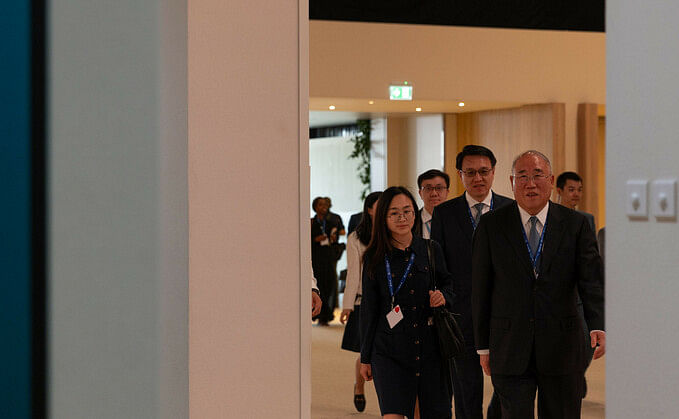
China climate envoy Xie Zhenhua heads to bilateral meeting earlier today | Credit: UNFCCC
Draft text from COP28 Presidency includes raft of proposals for accelerating the roll out of clean technologies and references the need to tackle fossil fuel production - but axes proposals for a full 'phase out'
The UN climate talks are set for a dramatic final day, after the COP28 Presidency published a long-awaited draft of its proposals for a final deal in Dubai, including what could prove to be an historic call to reduce fossil fuel consumption and production "in a just, orderly and equitable manner so as to achieve net zero by, before or around 2050".
The latest iteration of the Global Stocktake - widely regarded as the most important document being negotiated at this year's UN Climate Summit - was published late afternoon local time, finally giving observers the clearest indication yet of the shape of a compromise deal that could be adopted by almost 200 countries.
Crucially, the draft text axes previous references to the need to "phase out" unabated fossil fuels, following fierce opposition from Saudi Arabia, Iraq, and others. But the latest iteration does still directly call for a reduction in fossil fuel consumption and production by around mid-century. If adopted, the text would mark the first time fossil fuels have been explicitly referenced in a UN climate accord and would build significantly on the 2021 commitment to "phase down" unabated coal power.
The proposed text "recognises the need for deep, rapid and sustained reductions in greenhouse gas emissions" and sets out eight broad actions that countries can take to achieve them, covering renewables, energy efficiency, coal power plants, fossil fuel subsidies, low carbon hydrogen and carbon capture utilisation and storage (CCUS) technologies, and non-CO2 sources of emissions, among other efforts.
The text "calls upon" countries to take actions "that could" include "reducing both consumption and production of fossil fuels, in a just, orderly and equitable manner so as to achieve net zero by, before, or around 2050 in keeping with the science".
Supporting that call, there is also a paragraph calling for "accelerating" efforts to scale up low emissions technologies "so as to enhance efforts towards substitution of unabated fossil fuels in energy systems".
The specific technologies it cites include renewables, nuclear, and "abatement and removal technologies, including such as carbon capture utilisation and storage, and low carbon hydrogen production".
Moreover, the draft includes a reference to "rapidly phasing down unabated coal and limitations on permitting new and unabated coal power generation", and "accelerating efforts globally towards net zero emissions energy systems, utilising zero and low carbon fuels well before or by around mid-century".
And it pushes for the "phasing out of inefficient fossil fuel subsidies that encourage wasteful consumption and do not address energy poverty or just transitions, as soon as possible".
As with previous draft texts, the proposed agreement includes calls for a "tripling [of] renewable energy capacity globally and doubling [of] the global average annual rate of energy efficiency improvements by 2030", although references to specific capacity targets appear to have been removed.
Additionally, a broad call for "accelerating and substantially reducing non-CO2 emission, including, in particular, methane emissions globally by 2030" - which would largely impact oil and gas producers as well as agricultural firms - remains in the updated version of the text.
However, there is no specific call for action to reduce fossil fuels during the current decade, as has been demanded by various 'high ambition' countries and environmental groups, in recognition of the need to peak global emissions by 2025 and then reduce them by 43 per cent by 2030 to keep the Paris Agreement's 1.5C temperature goal within reached.
Green bonds issuance surpasses $2.5trn
Environmental groups also voiced frustration the proposed commitment "phase out" fossil fuels had been completely cut from the Global Stocktake text, and that the word "inefficient" has made it back into the text in relation to the need to curb fossil fuel subsidies.
The decision to include references to "abatement and removal technologies" alongside the calls for more renewable energy and energy efficiency efforts was also singled out for criticism by environmental groups, who gave their snap verdict on the text to journalists outside the halls of the negotiating rooms in Dubai.
Concerns were also raised that the language merely suggested nations "could" take the menu of eight broad actions outlined, rather than more robust wording that is often used in UN texts such as "should", which detractors warned may not provide a strong enough impetus for the rapid energy transition needed to put the world on a 1.5C-aligned pathway.
Accusations were quickly levelled at the likes of Saudi Arabia and Iraq for fighting against more ambitious "phase out" language being included in the text on fossil fuels, both of which have frequently been cited as among the biggest opponents of language pushing an end the global economy's dependency on coal, oil and gas.
All eyes will now turn to countries that have been seeking ambitious language on fossil fuels to provide a signal as to whether there is a deal to be done based on the text that is now on the table.
By Kate Abnett, Gloria Dickie and David Stanway for Reuters
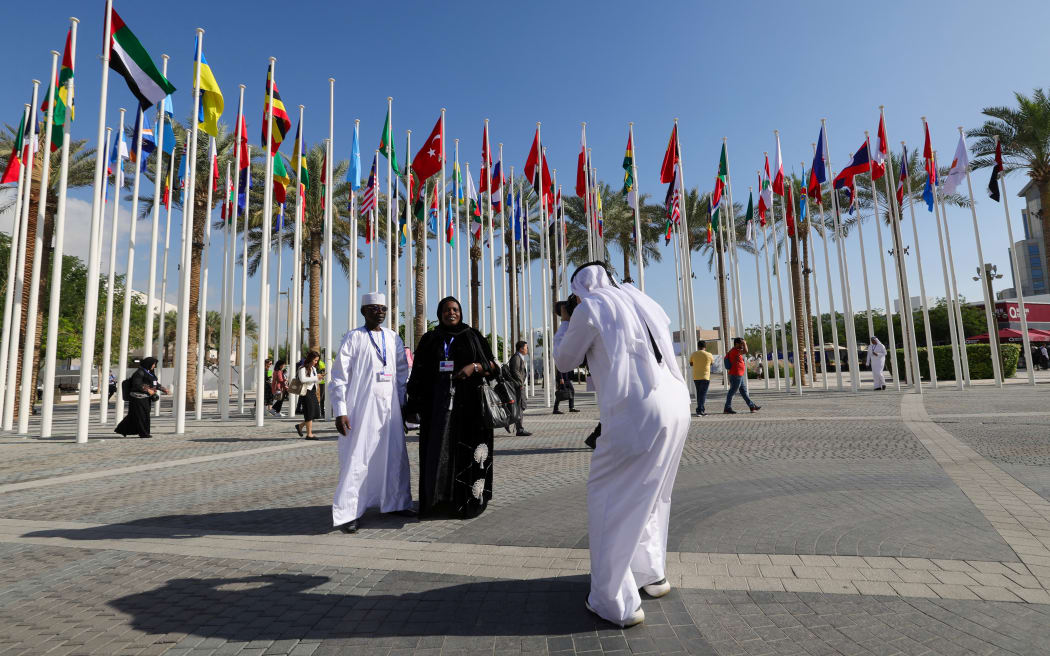
The draft will set the stage for a final round of contentious negotiations in the two-week summit in Dubai. Photo: AFP
A draft of a potential climate deal at the COP28 summit on Monday suggested a range of options that countries could take to reduce greenhouse gas emissions, but omitted the "phase out" of fossil fuels that many nations have demanded.
The draft will set the stage for a final round of contentious negotiations in the two-week summit in Dubai, which has laid bare deep international divisions over whether oil, gas and coal should have a place in a climate-friendly future.
COP28 President Sultan Al Jaber urged the nearly 200 countries at the talks to redouble their efforts to finalise a deal ahead of the scheduled close of the conference on Tuesday, saying they "still have a lot to do".
"You know what remains to be agreed. And you know that I want you to deliver the highest ambition on all items including on fossil fuel language," he said.
UN Secretary General Antonio Guterres has said a central benchmark of success for COP28 will be whether it yields a deal to phase out fossil fuels fast enough to avert disastrous climate change.
The new draft of a COP28 agreement, published by the United Arab Emirates' presidency of the summit, proposed various options but did not refer to a "phase out" of all fossil fuels, which had been included in a previous draft.
Instead it listed eight options that countries "could" use to cut emissions, including: "reducing both consumption and production of fossil fuels, in a just, orderly and equitable manner so as to achieve net zero by, before, or around 2050".
Other actions listed included: tripling renewable energy capacity by 2030, "rapidly phasing down unabated coal" and scaling up technologies including those to capture CO2 emissions to keep them from the atmosphere.
A coalition of more than 100 countries including big oil and gas producers from the United States, Canada and Norway, as well as the European Union and island nations, wanted an agreement that included language to phase out fossil fuels, a feat not achieved in 30 years of the UN summits. The emissions from burning fossil fuels are by far the main driver of climate change.
The US State Department called for the draft agreement language to be strengthened, while the European Union said the new text was disappointing.
"We appreciate the effort on the part of many to produce the text, which seeks to balance a variety of interests," the State Department said in a statement. "At the same time, the mitigation section, including the issue of fossil fuels, needs to be substantially strengthened."
EU chief negotiator Wopke Hoekstra told reporters: "It is lengthy, we're still looking into all the various elements. And yes, there are a couple of things in there. But overall, it is clearly insufficient, and not adequate to addressing the problem we are here to address."
Representatives from Pacific island nations Samoa and the Marshall Islands, already suffering the impacts of rising seas, said the draft was a death warrant.
"We will not go silently to our watery graves," said John Silk, the head of the Marshall Islands delegation.
"We cannot sign on to a text that does not have strong commitment on phasing out fossil fuels," Samoa environment minister Cedric Schuster told reporters.
A new draft document is expected on early Tuesday, which would leave little time for further disagreement ahead of the conference's scheduled close at 0700 GMT. COP summits rarely finish on schedule.
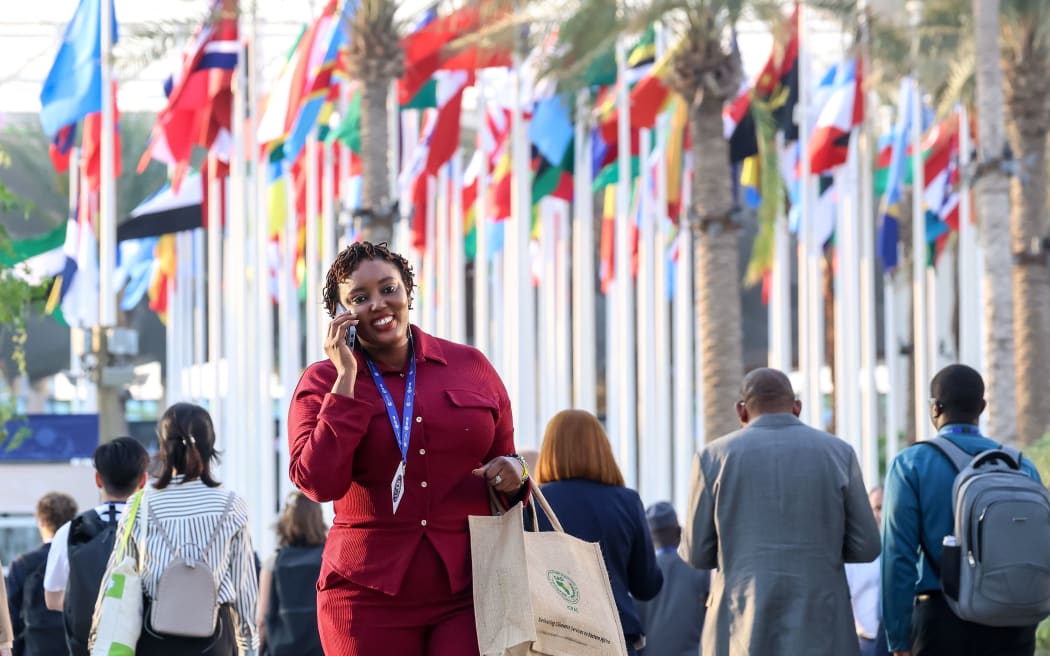
Photo: AFP
Pressure from Saudi Arabia
Sources familiar with the discussions said the UAE had come under pressure from Saudi Arabia, de facto leader of the OPEC oil producers' group of which UAE is a member, to drop any mention of fossil fuels from the text.
Saudi Arabia's government did not respond to requests for comment on Monday.
It was unclear if China, currently the world's top greenhouse gas emitter, supported the draft.
Leaving their pavilion, senior members of the China delegation, including chief envoy Xie Zhenhua, did not respond to questions.
But observers noted that some of the language in the document was in line with China's previous policy positions, as well as the Sunnylands agreement signed by China and the United States in November.
The Sunnylands agreement did not use contentious phrases like "phasing out" but instead called for the accelerated substitution of coal, oil and gas with renewable energy sources, and backed the pledge to triple renewable energy by 2030.
Xie told reporters on Saturday the language in the Sunnylands agreement could provide an opportunity for a breakthrough at COP28.
Brazilian climate negotiator Ana Toni said: "This is an attempt to include the perspectives of all, and not to exclude anyone."
Consensus needed for any deal
For oil-producing nations, a global deal at COP28 to ditch fossil fuels - even without a firm end date - could signal a political willingness from other nations to slash their use of the lucrative products on which fuel-producing economies rely.
Speaking to ministers and negotiators on Sunday, a representative for Saudi Arabia's delegation said a COP28 deal should not pick and choose energy sources, but should instead focus on cutting emissions.
That position echoes a call made by OPEC in a letter to its members earlier in the summit, seen by Reuters, which asked them to oppose any language targeting fossil fuels directly.
Deals at UN climate summits must be passed by consensus among the nearly 200 countries present. That high bar aims to establish a consensus on the world's next steps to tackle climate change, which individual countries should then make happen through their national policies and investments.
Developing nations have said any COP28 deal to overhaul the world's energy system must be matched with sufficient financial support to help them do this.
"We need support as developing countries and economies for a just transition," said Colombia's Environment Minister Susana Muhamad said. Colombia supports a COP28 deal to phase out fossil fuels.
Despite the rapid growth of renewable energy, fossil fuels still produce around 80 percent of the world's energy.
Negotiators told Reuters that other OPEC and OPEC+ members including Russia, Iraq and Iran, have also resisted attempts to insert a fossil fuel phase-out into the COP28 deal.
This story was first published by Reuters.
Parties still not on same page about responsibilities in GST text; final texts on carbon market expected December 11
By Akshit Sangomla, Avantika Goswami, Tamanna Sengupta, Trishant Dev, Rohini Krishnamurthy, Parth Kumar
Published: Monday 11 December 2023

The 28th Conference of Parties (COP28) to the United Nations Framework Convention on Climate Change in Dubai, United Arab Emirates (UAE), began November 30, 2023. Here’s a look at what happened on the eleventh day of COP28.
Adaptation
A new draft text on the Global Goal on Adaptation (GGA) was introduced by the COP28 presidency on the morning of December 10. The text is weaker than the earlier draft not only on the means of implementation (MOI) from developed countries to developing countries but also on thematic targets such as ecosystems.
The MOI, which includes finance for adaptation measures by developing countries to make vulnerable communities resilient to the ongoing impacts of climate change, is crucial for meeting other specific targets under the GGA framework such as the assessments of risks and vulnerabilities that need to be conducted by countries and also implementing adaptation measures.
The financial target of $400 billion dollars and the language around the adaptation finance gap have been removed from the text.
Some developing country groups feel that the GGA framework would fail without an assurance on adaptation finance. The principle of common but differentiated responsibilities is also still an option.
Majlis
The COP28 President Sultan Al Jaber convened a Majlis, a gathering of one head of delegation / minister from each country, to sit in a circle and speak openly. Countries made impassioned statements about their priorities for the COP28 outcome.
Australia Climate Minister Christopher Bowen said despite being one of the largest oil and gas exporters, Australia believes that fossil fuels have no ongoing role in our energy systems and abatement is not a reason for delay, just a part of the overall solution.
South Africa mentioned that they have received only 10 per cent of the money promised under the Just Energy Transition Partnerships (a financial mechanism that aims to help a selection of heavily coal-dependent emerging economies make a just energy transition), and for them, the issue is a means of implementation gap, not an ambition gap.
Bolivia spoke about “procrastination, protectionism, unilateral trade measures” inhibiting climate action. They also said even though developed countries claim the $100 billion target is met, no concrete, tangible money has been seen.
French Energy Minister Agnes Pannier-Runacher said, “I am making it crystal clear — we have met $100 billion last year and this year.”
Global Stocktake
There is broad support for the Global Stocktake (GST) to take its basis in science and equity, leading to higher ambitions and balanced outcomes. However, there are still many areas where Parties are far apart from each other.
There are different views on how to address past, present and future responsibilities in light of the best available science, Common but Differentiated Responsibilities and Respective Capabilities (a principle acknowledges the different capabilities and differing responsibilities of individual countries in addressing climate change) and equity, opposing views on concerns about unilateral measures, and how to include suggestions on ways forward that do not interfere with the nationally determined nature of NDCs.
Consultations continued on Sunday morning in informal-informals, which is closed to observers. The Presidency is expected to present the GST text for the COP28 package by the morning of December 11, following the Majlis on Sunday.
Carbon markets
Article 6.2: Conversations took place in an informal-informal format. Discussions were far from achieving consensus. Parties held conflicting views, such as whether to have a single authorisation for everything for trading and transfer of Internationally Transferred Mitigation Outcomes or obtain authorisation at every step. A take-it-or-leave-it text is expected to be released on December 11, 2023.
Article 6.4: Late-night informal-informal meetings on priority issues of the work programme for removals and methodologies occurred. Another topic of discussion has been paragraph 9 of the draft, which requests the supervisory body to work on the sustainable development tool, appeals and grievance procedures, and tools and guidance on baseline, additionality, and leakage for fully operationalising the mechanism. A final text is anticipated to be released on Article 6.4 on December 11.
Impact of COP28 pledges
COP28 saw several pledges from companies and industries. On December 10, the International Energy Agency (IEA) said delivery on these pledges would result in the global energy-related greenhouse gas emissions in 2030 being around four gigatonnes of carbon dioxide equivalent lower than would be expected without them. This, it added, would not be nearly enough to move the world onto a path to limiting global warming to 1.5°C.
Another analysis by the Climate Action Tracker found that many of the announcements lack the ambition, clarity, coverage or accountability needed to make a difference. Further, a lot of them are difficult to measure or overlap with those made at COP26 in Glasgow.
1.5°C for cryosphere
At a side event, cryosphere researchers said the two degrees Celsius upper limit of the Paris Agreement is too high to save the cryosphere. They said a 1.5°C state should not be the preferable option, but the only option.
Everything happening in the Arctic, for example, influences the rest of the world. “The Arctic cannot tolerate above 1.5°C. Beyond that, we start to see irreversible changes,” Heidi Sevestre, glaciologist at The Arctic Monitoring and Assessment Programme.
Finance
At a press conference, Bangladesh expressed its disappointment over negotiations on climate finance. The country added that commitments of $100 billion have not been met yet and that they have strong reservations on the methodologies of collection of climate financing. They also want to see a phaseout of fossil fuels but call for a differentiation between developed and developing countries.
India-Sweden Industrial Transition Partnership
After the launch of the India-Sweden Industrial Transition Partnership on December 1 by the Prime Ministers of both countries at COP28, the Indian Union Minister for Environment, Forest and Climate Change, Bhupender Yadav, and Sweden’s Minister of Climate and Environment, Roumina Pourmokhtari, came together for an event at the Swedish Pavilion to further this partnership.
The Swedish minister said, “We need partnerships between ambitious economies to address issues like the lack of commercially viable low carbon technology and long-term investment cycle risk locking in carbon emissions are the issue”.
Yadav emphasised on cooperation in areas like tech transfer, finance, intellectual property rights, knowledge exchange and joint research. The event also portrayed the partnership formed between SaltX, a company from Sweden, and Dalmia Cement from India for making fossil fuel-free cement using renewable energy completely.
